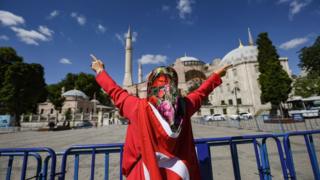 Image copyright
Getty Images
Image caption
A woman wrapped in a Turkish national flag gestures outside the Hagia Sophia museum
Image copyright
Getty Images
Image caption
A woman wrapped in a Turkish national flag gestures outside the Hagia Sophia museum
The world-famous Hagia Sophia museum in Istanbul - originally founded as a cathedral - has been turned back into a mosque.
Turkey's President Recep Tayyip Erdogan announced the decision after a court annulled the site's museum status.
Built 1,500 years ago as an Orthodox Christian cathedral, Hagia Sophia was converted into a mosque after the Ottoman conquest in 1453.
In 1934 it became a museum and is now a Unesco World Heritage site.
Defending the move, a Turkish official stressed that tourists could still visit the site after it once more became a mosque.
"May it be beneficial," Mr Erdogan said on Twitter, sharing a caption of the decision with his signature.
Islamists in Turkey long called for it to be converted to a mosque but secular opposition members opposed the move. The proposal prompted criticism from religious and political leaders worldwide.
Shortly after the move, the first call to prayer was recited at the Hagia Sophia and was broadcast on all of Turkey's main news channels. The cultural site's social media channels have now been taken down.
What has the reaction been?
Unesco has said it "deeply regrets" the decision to turn the museum into a mosque. The organisation had urged Turkey not to change its status without discussion.
Image copyright Getty Images Image caption The Hagia Sophia has huge significance as a religious and political symbolThe head of the Eastern Orthodox Church has condemned the move, as has Greece - home to many millions of Orthodox followers.
Culture Minister Lina Mendoni said it was an "open provocation to the civilised world".
"The nationalism displayed by President Erdogan... takes his country back six centuries," she said in a statement.
The court ruling "absolutely confirms that there is no independent justice" in Turkey, she added.
Image copyright Getty Images Image caption The site is now one of Turkey's most visited tourist attractionsBut the Council of State, Turkey's top administrative court, said in its ruling on Friday: "It was concluded that the settlement deed allocated it as a mosque and its use outside this character is not possible legally."
"The cabinet decision in 1934 that ended its use as a mosque and defined it as a museum did not comply with laws," it said.
The Church in Russia, home to the world's largest Orthodox Christian community, immediately expressed regret that the Turkish court had not taken its concerns into account when ruling on Hagia Sophia.
It said the decision could lead to even greater divisions.
While the move is popular with conservative religious supporters of President Erdogan, Turkey's most famous author, Orhan Pamuk said the decision would take away the "pride" some Turks had in being a secular Muslim nation.
"There are millions of secular Turks like me who are crying against this but their voices are not heard," he told the BBC.
But Turkey hit back at claims that the move would exclude people of other faiths.
"Opening up Hagia Sophia to worship doesn't keep local or foreign tourists from visiting the site," Ibrahim Kalin, Turkey's presidential spokesperson, told Anadolu Agency.

 5 years ago
725
5 years ago
725 

